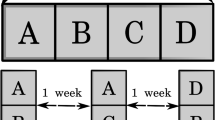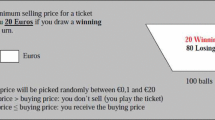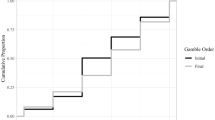Abstract
Much experimental effort has been expended in attempts to establish the relative superiority of Expected Utility theory and the many recently-developed alternatives as descriptions of the behaviour of subjects in risky choice decision problems. The cumulative evidence shows clearly that there is a great deal of noise in the experimental data, which makes it difficult to identify the ‘best’ description of such behaviour. This paper reports on an experiment which seeks to determine whether such noise is relatively transitory and decays with experience and repetition, and thus whether a clearly ‘best’ theory emerges as a result of such repetition. We find that for some subjects this does indeed appear to be the case, while for other subjects the noise remains high and the identification of the underlying preference function remains difficult.
Similar content being viewed by others
References
Carbone, E. (1997). “Investigation of Stochastic Prefence Theory using Experimental Data.” Economics Letters. 57, 305–311.
Cubitt, R., Starmer, C., and Sugden, R. (1998). “On the Validity of the Random Lottery Incentive Mechanism.” Experimental Economics. 1, 115–132.
Harless, D. and Camerer, C. (1994). “The Predictive Utility of Generalized Expected Utility Theories.” Econometrica. 62, 1251–1290.
Hey, J.D. (1997). “Experiments and the Economics of Individual Decision Making.” In D.M. Kreps and K.F. Wallis (eds.), Advances in Economics and Econometrics. Cambridge University Press, 171–205.
Hey, J.D. and Orme, C.D. (1994). “Investigating Generalizations of Expected Utility Theory using Experimental Data.” Econometrica. 62, 1291–1326.
Holt, C.A. (1986). “Preference Reversals and the Independence Axiom.” American Economic Review. 76, 508–515.
Karni, E. and Safra, Z. (1987). “Preference Reversal' and the Observability of Preference by Experimental Methods.” Econometrica. 655, 675–685.
Machina, M. (1982). “Expected Utility' Analysis without the Independence Axiom.” Econometrica. 50, 277–323.
Author information
Authors and Affiliations
Rights and permissions
About this article
Cite this article
Hey, J.D. Does Repetition Improve Consistency?. Experimental Economics 4, 5–54 (2001). https://doi.org/10.1023/A:1011486405114
Issue Date:
DOI: https://doi.org/10.1023/A:1011486405114




